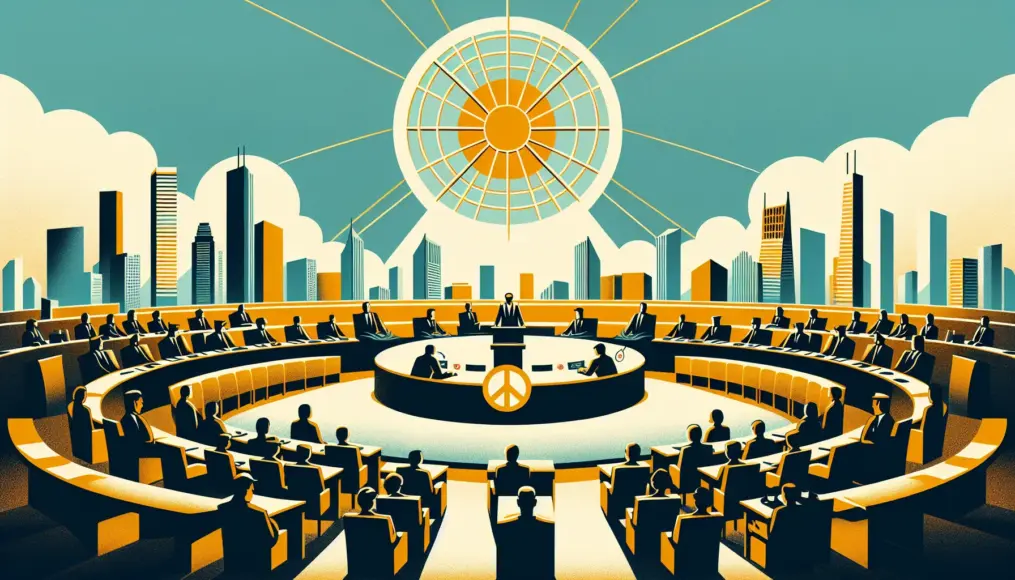The San Francisco Peace Treaty stands as a historic document marking a significant step for Japan in rejoining the international community after World War II. This treaty was not just about ending the war; it also prompted a profound reevaluation of the ideals of peace and the nature of international relations. In this article, we’ll explore the philosophical significance of this crucial treaty and its impact on contemporary society.
The ideals and lessons brought forth by the peace treaty continue to influence today’s international landscape and domestic politics. Reflecting on past events and reassessing the challenges ahead for peacebuilding is an essential theme for us all. Let’s delve into the significance of the San Francisco Peace Treaty and consider how its principles are still relevant in our modern world.
- Background and key provisions of the San Francisco Peace Treaty
- The philosophy of peace and the concept of reconciliation within the treaty
- The treaty’s impact on international relations and domestic politics today
What is the San Francisco Peace Treaty?
The San Francisco Peace Treaty, signed in 1951, was a pivotal international agreement that marked a significant step for Japan in its return to the global community after World War II. Through this treaty, Japan officially ended its state of war with the Allied Powers and regained its sovereignty. The signing of this treaty played a critical role in shaping the post-war world order and laid the groundwork for a new framework of international relations.
In this section, we will delve into the background leading up to the signing of the San Francisco Peace Treaty and explore its key provisions. By understanding the historical context, we can gain a deeper appreciation for the significance of this treaty.
Background of the Signing
The San Francisco Peace Treaty was an essential step for post-war Japan in rebuilding its relations with the Allied Powers. Following its defeat in the war, Japan needed to reassess its position in the international arena. The Allies, particularly the United States, hoped that post-war Japan would transform into a nation committed to peace and contributing to the global community.
The treaty was also influenced by the dynamics of the Cold War, emphasizing the importance of a security alliance with the United States to ensure Japan’s safety. This alliance paved the way for Japan’s economic revival and its reintegration into the international community.
- The San Francisco Peace Treaty was signed in 1951.
- Japan ended its state of war with the Allied Powers through this treaty.
- The signing marked a crucial turning point for Japan’s sovereignty and reintegration into the international community.
Key Provisions of the Treaty
The Peace Treaty contains several important provisions. At its core, it stipulates that Japan renounces any rights arising from the war. This created the foundation for normalizing relations with the Allied Powers and restoring Japan’s status under international law. The treaty also addresses territorial issues, including key elements related to the Northern Territories dispute.
Additionally, the treaty outlines the conditions for Japan’s membership in the United Nations and calls for efforts to prevent the resurgence of war. Thus, the San Francisco Peace Treaty encompasses crucial content that would shape Japan’s future and significantly influence post-war international relations.
- The treaty requires Japan to renounce any rights stemming from the war.
- It includes provisions regarding territorial issues.
- Conditions for Japan’s United Nations membership and efforts to prevent future conflicts are also included.
The Philosophical Significance of Treaties
The San Francisco Peace Treaty symbolizes more than just the end of a war; it carries profound philosophical significance regarding peace and reconciliation. This treaty serves as a crucial turning point in contemplating how to build peace in the post-war international community and how to overcome past conflicts. The concept of peace goes beyond merely avoiding war; it involves establishing a foundation of mutual understanding and coexistence.
In this section, we will delve into the philosophies of peace and reconciliation that the San Francisco Peace Treaty embodies. These principles provide essential guidance not only for post-war Japan but also for today’s international society.
The Philosophy of Peace
The philosophy of peace explores how individuals and nations can avoid conflicts and maintain harmony. Within the context of the San Francisco Peace Treaty, accepting the outcomes of war and acknowledging war responsibilities are seen as the first steps toward achieving true peace. This attitude is vital for learning from past mistakes and preventing future conflicts.
Moreover, the ideals of peace called for by the treaty serve as a foundation for spreading peace throughout the international community. The belief that countries can achieve sustainable peace through cooperation remains relevant today.
- The philosophy of peace seeks to avoid conflicts and maintain harmony.
- Accepting the outcomes of war is viewed as the first step toward true peace.
- Achieving sustainable peace through international cooperation is highly valued.
The Philosophy of Reconciliation
The philosophy of reconciliation aims to overcome historical conflicts and deepen mutual understanding. The San Francisco Peace Treaty called for overcoming past hostilities and building new relationships. This emphasis on former adversaries cooperating as friendly nations is crucial.
Reconciliation is an important theme not just for individual countries but for regions and the international community as a whole. To transcend historical conflicts, mutual understanding and compromise are essential. The principles of reconciliation exemplified by the San Francisco Peace Treaty will continue to offer valuable insights for future international relations.
- The philosophy of reconciliation aims to overcome past hostilities.
- Building new friendships is emphasized.
- Mutual understanding and compromise are vital in international relations.
The Impact on Modern Society
Even decades after its signing, the San Francisco Peace Treaty continues to have a significant influence on international relations and domestic politics. It’s crucial to consider how the ideals of peace and reconciliation that this treaty embodies are being applied in the global community. Particularly in the context of post-Cold War international relations and regional stability, the role of the San Francisco Peace Treaty cannot be overlooked.
In this section, we will explore the effects of the San Francisco Peace Treaty on contemporary international relations and Japan’s domestic politics. By re-evaluating the significance of the treaty, we can better understand the challenges and prospects we face today.
Impact on International Relations
The San Francisco Peace Treaty played a pivotal role in establishing Japan’s position on the global stage. Through the treaty, Japan gained recognition as a trusted partner in the post-war international order. This status has allowed Japan to contribute to regional stability and play an active role in the United Nations and various international organizations, promoting peacekeeping and development efforts.
Moreover, the signing of the treaty solidified the alliance between Japan and the United States, laying the groundwork for regional security. Such international cooperation remains a vital element in today’s complex global landscape.
- The San Francisco Peace Treaty enabled Japan to gain international trust.
- Japan’s activities in the United Nations and international organizations became more active.
- The alliance between Japan and the United States was strengthened, ensuring regional security.
Impact on Domestic Politics
The San Francisco Peace Treaty has also had a significant impact on domestic politics. It prompted Japan to acknowledge its wartime responsibilities and to build a new political framework based on reflection on its past. This led to the promotion of policies rooted in pacifism and a shift in the public consciousness.
Additionally, following the treaty’s signing, Japan established its pacifist constitution, embedding the principle of renouncing war into the nation’s foundation. This constitutional ideal has greatly influenced both domestic and foreign policies, contributing to the formation of a society that prioritizes peace.
- The treaty necessitated Japan’s recognition of its wartime responsibilities.
- Policies based on pacifism were promoted, leading to changes in public consciousness.
- The pacifist constitution became a cornerstone of the nation, affecting domestic and international policies.
Insights and Challenges for the Future
The San Francisco Peace Treaty offers crucial guidance on how to learn from past events and build a peaceful future. This treaty is not merely a post-war settlement; it is filled with lessons on how the international community can achieve sustainable peace. As we look ahead to future global dynamics, efforts toward peacebuilding and responses to new challenges are essential.
In this chapter, we will explore the lessons the San Francisco Peace Treaty provides for peacebuilding, as well as the challenges we are likely to face moving forward. It is vital to harness lessons from the past while charting new paths toward the future.
Lessons for Peacebuilding
The most significant lesson we can glean from the San Francisco Peace Treaty is the importance of dialogue and cooperation. Overcoming historical conflicts requires abandoning hostile attitudes and making concerted efforts to deepen mutual understanding. As this treaty illustrates, choosing dialogue over war can lead to the establishment of lasting peace.
Moreover, peace is not a temporary state but requires ongoing commitment. By working together, the international community can continue its efforts to maintain peace and ensure a stable society for future generations.
- Dialogue and cooperation are crucial for peacebuilding.
- Choosing dialogue over war leads to sustainable peace.
- Peace requires continual effort, and cooperation is essential.
Future Challenges
While we draw on the lessons of the San Francisco Peace Treaty, new challenges confront the modern international community. Geopolitical tensions, terrorism, and environmental issues are just a few of the factors that threaten peace. Addressing these challenges will necessitate cooperation across the international community.
Additionally, domestic political circumstances can have a significant impact. Changes in public sentiment and political trends can influence peacekeeping efforts, making it essential to remain vigilant and responsive to evolving situations. It is vital not to forget the spirit of the San Francisco Peace Treaty as we continue our efforts toward a peaceful future.
- Geopolitical tensions, terrorism, and environmental issues pose new challenges.
- Cooperation across the international community is needed.
- Domestic political conditions affect peacekeeping, requiring flexible responses.
Conclusion
The San Francisco Peace Treaty marks a significant milestone for Japan’s return to the international community following World War II, rooted in the ideals of peace and reconciliation. This treaty not only signifies the end of the war but also establishes a new framework for international relations and has had a profound impact on domestic politics. Recognizing the philosophy of peace and the importance of reconciliation remains vital in today’s society.
Moreover, the lessons drawn from this treaty provide guidance for future peacebuilding efforts. As international dynamics grow increasingly complex, pursuing sustainable peace requires ongoing dialogue and cooperation. We must also remain adaptable in the face of new challenges and commit ourselves to maintaining peace.
- The San Francisco Peace Treaty was a crucial turning point for post-war Japan’s reintegration into the global community.
- The ideals of peace and reconciliation exemplified by the treaty continue to influence modern international relations.
- Dialogue and cooperation are essential for future peacebuilding efforts.
It is important to reaffirm the significance of the San Francisco Peace Treaty and to consider how we should confront the challenges we face today. We would love to hear your thoughts and opinions on this article, so please feel free to share them in the comments!



Comment